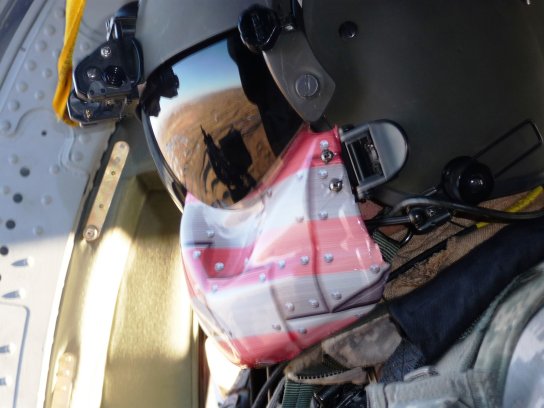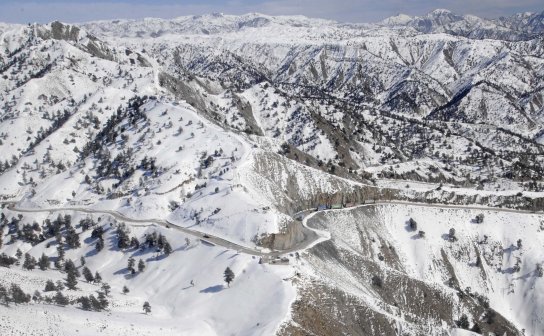
Army Spc. Jose DeLeon displays his American pride as he mans a .50 caliber machine gun, on a UH-60 Black Hawk, during a mission in Afghanistan. DeLeon is attached to Company G with the 7th Battalion, 101st Airborne Division stationed at Fort Campbell, Ky.

New Roads to Open Up Eastern Afghanistan Province
Semi-trucks hauling goods to eastern Afghanistan travel along the narrow and dangerous “K-G Pass” that works its way through steep mountains and connects the Khowst and Paktia provinces.
A $100 million, 62-mile improved road, funded by the U.S. Agency for International Development, is slated to start construction through the pass this summer.
Many of the locals have never seen a road come to their village. Most use dry “wadis,” or creek beds, to traverse the rugged landscape. The roads are, PRT leaders said, a dream come true. Many locals are so eager, they are willing to allow the walls of their “qalats,” which are mud and straw fortresses, to be torn down to make room for the roads, Kreuzberger said.
Also opening up the province, a $100 million, 62-mile road is being built from nearby Khowst City to Gardez City, linking the Khowst and Paktia provinces. Work has started at both ends. But before it is finished, it must cut through the treacherous “K-G Pass,” a narrow road that winds along the steep mountainside at elevations above 7,000 feet.
Making it more difficult, the road is hotly contested by insurgent fighters who don’t want the link between the two provinces.
The road projects serve a dual benefit, Kreuzberger said. They develop the infrastructure, but also put local people to work boosting the local economies and helping with security.
“We’re paying them instead of the Taliban paying them,” Kreuzberger said.
Speed is of the essence for the road projects. Locals become skeptical if they hear a road is coming, but no work starts. They are not patient with large road projects that can take a couple of years from conception to completion.
“One thing we’ve found in this culture is there is no tomorrow. They live for today,” Kreuzberger said. “And if they don’t see something happening, then they don’t think it’s happening.”
Improved roads also bring a safety benefit. Paved roads make it more difficult to emplace bombs, Kreuzberger said.
Right now, locals who drive the “jingle trucks,” — highly decorated semitrucks full of goods — risk their lives and loads as they travel the rough highways. They are heavy enough to set off the pressure-plate activated bombs, popular in the region.
“Improvised explosive devices don’t discriminate,” Kreuzberger said.
The road crews and their equipment often are targets of enemy fighters. Building a road takes expensive equipment that is costly to fuel and hard to protect. Many contractors build security into the contracts as they bid on the work.
The insurgency has a vested interest in stopping the development, Kreuzberger said.
“You keep locals back in the stone ages and they don’t know any better,” he said of the insurgent grip on many remote villages. “If you’ve got nothing, you’ve got nothing to lose.”

Wild Thing’s comment………
This story about the road in the mountains that connects the Khowst and Paktia provinces made me think of the road QL 9 from Khe Sanh to Dong Ha in Vietnam. Not that I am comparing the two, just something about it made me think of QL9.

Rant on: we taxpayers are paying for this…fine. Maybe it will help us with the mission there or maybe it’s just another giant give away. I don’t know enough about Afghanistan yet.
But for cripes sakes…who cares if the villagers have to have things done fast or they don’t believe it will happen? Geez. Rant off.
Eden, good rant!